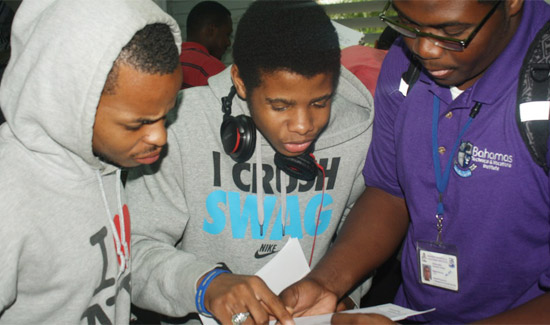 On October 2, 2014, the Pan American Development Foundation (PADF), the U.S. State Department’s Bureau of International Narcotics and Law Enforcement Affairs (INL), and the Government of the Commonwealth of The Bahamas’ Department of Education’s Guidance and Counseling Unit launched a series of experiential learning initiatives designed to familiarize youths with the country’s laws, develop an appreciation of the legal process, encourage responsible political participation, develop moral and ethical values, and develop analytical skills.
On October 2, 2014, the Pan American Development Foundation (PADF), the U.S. State Department’s Bureau of International Narcotics and Law Enforcement Affairs (INL), and the Government of the Commonwealth of The Bahamas’ Department of Education’s Guidance and Counseling Unit launched a series of experiential learning initiatives designed to familiarize youths with the country’s laws, develop an appreciation of the legal process, encourage responsible political participation, develop moral and ethical values, and develop analytical skills.
This initiative, which is part of the broader Resistance and Prevention Program (RAPP) that aims to build mutual trust between the police, the government and the youth of the country, offered one-hundred students from eight high schools the opportunity to participate in a job-shadowing program called “Law Day” on October 2. Law Day enabled students to interact with mentors in courts and other law enforcement branches that focus on citizen security and protection, experiencing the workplace and workday first hand. The program aims to:
• Demonstrate the connection between academics and careers, encouraging students to learn by making their class work more relevant;
• Build community partnerships between schools and businesses that enhance the educational experience of all students;
• Introduce students to the requirements of careers in the justice sector to help them prepare to join the workforce of the 21st century;
• Encourage an ongoing relationship between young people and caring adults; and
• Encourage productive citizenship by building an understanding of the attendant duties, rights, and privileges.
The RAPP program is the result of a partnership between PADF and INL under the Caribbean Basin Security Initiative (CBSI). Local partners include the Ministry of Social Services and Community Development, The Royal Bahamas Police Force, The Royal Bahamas Defense Force, The Bahamas Bar Association, The Ministry of Legal Affairs, The Ministry of Education’s Guidance Department, civil society organizations, the business sector and youth groups.
The Director of U.S. Embassy Nassau’s INL Section, Kristin Gilmore, expressed her enthusiasm about the initiative, and said that “job shadowing will not only introduce students to career opportunities in the justice sector, but help promote social justice.”
According to Dr. Novia Carter, a psychologist and PADF Program Coordinator, “RAPP’s Law Day has great potential as a locus for crime prevention because it helps Bahamian youth reconnect to their families, neighborhood, and communities, and ultimately can lead to being a productive citizen of The Bahamas.”
She adds, “Many young persons throughout The Bahamas experience adverse ecological conditions which disrupt the formation and maintenance of community relations and networks. As a result, the social processes which would otherwise produce social control are compromised. These disruptions endanger the development of a young person from developing regular social norms, rules and relationships and give rise to disorder, crime and other delinquent behaviors.”
About RAPP’s job shadowing program, C.V. Bethel High School Guidance Counsellor Dellareese Bethel said, “Many students lack knowledge about the law, citizenship skills, and positive attitudes about the law and the role of the government.” She added, “If we can get students to appreciate their role as participants in the fight against crime, we are one step closer to creating a crime free Bahamas.”
United States Embassy, Nassau
BACKGROUND:
About PADF
PADF is a non-profit foundation established in 1962 by the Organization of American States to implement integral socio-economic development programs for disadvantaged people, to strengthen civil society and community groups in support of the Inter-American Democratic Charter, and to aid victims of natural disasters and humanitarian crises. In 2013, it assisted more than 10 million people in 23 countries. Headquartered in Washington D.C., PADF has field offices in Haiti, Colombia, Suriname and Honduras, and projects throughout Latin America and the Caribbean. www.padf.org
About INL
The Bureau of International Narcotics and Law Enforcement Affairs (INL) advises the President, Secretary of State, bureaus in the Department of State, and other departments and agencies within the U.S. Government on the development of policies and programs to combat international narcotics and crime. INL programs seek to reduce the entry of illegal drugs into the United States and to minimize the impact of international crime on the United States and its citizens. http://www.state.gov/j/inl
About CBSI
The Caribbean Basin Security Initiative (CBSI) is a regional security partnership between the United States and the nations of the Caribbean to combat the drug trade and other transnational crimes that threaten regional security. The United States, CARICOM member nations, and the Dominican Republic are improving citizen safety throughout the Caribbean by working together to: substantially reduce illicit trafficking, increase public safety and security, and promote social justice.




